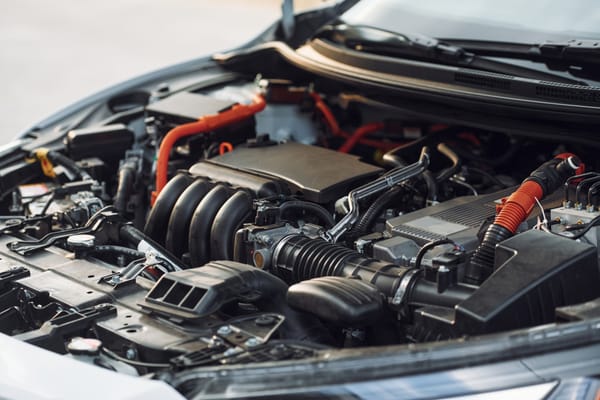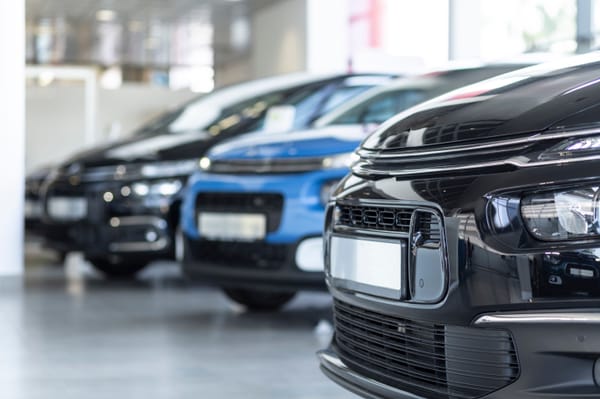I Bought My First Car with My Side Hustle Money – Here’s How!

For most Kenyan youth starting their careers, the idea of owning a car feels like fiction. Entry-level salaries barely cover rent, food, and fare — let alone saving hundreds of thousands for a vehicle. When you’re spending over Ksh 6,000 a month on matatus and still arriving late due to unpredictable traffic, the math simply doesn’t add up.
With the average foreign-used car costing upwards of Ksh 500,000, traditional advice like “just save part of your salary” feels tone-deaf — especially if you're the firstborn in an African household. Responsibilities can overwhelm even the most ambitious.
But here’s the thing — I did it. And I didn’t do it with a big inheritance or flashy job. I bought my first car — a 2007 Toyota Premio — with money I made from a side hustle.
Let me show you how.
From the Masinde Muliro to Nairobi’s Reality Check
I graduated from Masinde Muliro University in 2014 with a journalism degree and big dreams. The dream? Land a great media job, make money, buy a car, get a wife, kids, a white picket fence, you know the drill…
Living with a cousin in Makongeni, I'd often walk home past car yards and whisper to myself, “Ipo siku.”
- First Job – Three months after graduating, that’s in March 2015, the first job I got was at a consumer insights company at Riara Suites, behind The Junction in Ngong Road, for a call centre job. I was excited, and the job was easy, or so I thought, until I spent hours calling strangers who mostly didn't want to talk to me.
- Reality Check – I lived with my cousin in Makongeni, Jogoo Road. Being broke, I’d walk all the way sometimes, admiring the used cars sold by different dealers along the road and telling myself, “Ipo siku.” I was hopeful, knowing that the job would get better and I’d start contributing to the rent, just to show I was serious.
- The Pay? – It was on commission, and it didn’t pan out the way I’d hoped. The total amount was based on how many people successfully answered boring questions they didn’t want to answer. In my first month, I earned Ksh 9,200. In the second month, I got Ksh 8,300 via M-Pesa. I quit.
- Other hustles: I tried everything, from betting with money I didn’t have to media support on Sundays at church to tutoring ‘rich kids’ in the evening, even hanging around media houses and colleges for teaching opportunities. A year went by, and nothing stuck.
- Rock bottom: In April 2016, after staying and not contributing rent for so long (my cousin understood, but I felt guilty), I moved to a mabati house in Mlolongo with a friend. I continued sending applications and looking for jobs, and idling at Uhuru Park, and no luck. I took a job offloading cargo at a go-down near Gateway Mall for a mere Ksh 720/day. This left my slender frame aching, and I quit in September 2016.
A month later, I packed up and left Nairobi— “shamba la mawe” indeed. In December, during a family gathering, my cousin mentioned copywriting and how he was making a killing on the copywriting platform TextBroker. He, however, said he bought his account at Ksh 40,000 from a friend in the US and advised me to do the same.
I didn’t have the cash to purchase a TextBroker account (at the time, you could only use a US number for verification), so he recommended that I work with one of his friends who had different accounts. I agreed, got in touch, and she interviewed me:
- I passed the writing test and got work; the pay was Ksh 500 for 1,000-word articles. Not great, but better than loading frozen fish into a container.
- I pushed myself to 3,000 words daily and started making around Ksh 50,000/month by mid-2017.
- I then bought a laptop, moved back to Nairobi, and got a Ksh 5,000 bedsitter in Mlolongo.
The Copywriting Setback and PR Agency Breakthrough
Soon after, Kenyans were banned from TextBroker, and my boss ghosted me with two months’ salary. That stung. But I didn't give up. I pivoted to local writing gigs—speeches, editorials, and articles. That exposure led me to a digital marketing job.
In June 2018, through a recommendation from one of my writing clients, I landed a job at a PR agency in Parklands, Nairobi, as a content executive. My salary was Ksh 54,000 (after deductions).
My fixed monthly expenses were simple:
- Rent: Ksh 5,000
- Food and groceries: Ksh 8,500 (we were provided lunch at work, and I’d carry leftovers mostly to warm and eat in the evening)
- Transport: Ksh 6,500 (to Mlolongo, the average was Ksh 80 daily, and to Parklands, Ksh 30. In a day, I’d spend roughly Ksh 220, but I’d often use a train to Syokimau to save costs.)
- Internet: Ksh 1,500 (I was using Telkom data for my online jobs)
- Black Tax (yeah, that amount expected from you by your relatives): Ksh 8,000
- Miscellaneous: Ksh 3,000
That left me with around Ksh 21,500 in savings, which I used to pay for my sister’s college, and it wasn’t until the end of November 2018 that I started saving for a car.
Even if I didn’t have that responsibility and saved the whole amount, it’d have taken nearly three years to save for even the most basic car. With such a savings plan, one would need to save a consistent Ksh 20,000 to pay cash for the most affordable vehicle available (often with a good number of years on the road). I’m talking about used cars that range from Ksh. 500,000 and below.
I didn’t want to take that long, and that’s why, through my side hustle, and a savings plan of eight months, I drove home in a Toyota Premio purchased entirely with my own money. Here's the strategic approach that made this possible.
How Copywriting Helped Me Buy My First Car
While the PR job paid somewhat well, it also exposed me more to the fast-paced world of communications, marketing, and storytelling. If anything, this taught me one thing: that relying on a single income stream was risky in Kenya’s competitive market.
Eager to diversify my earnings, I found more freelance work on platforms like Upwork and Fiverr. I also improved my LinkedIn profile. In late September 2018, I landed a high-paying client who paid Ksh 4 per word through LinkedIn! The pay was a significant improvement from the 50 cents I got per word.
They needed 3 to 4 articles weekly (1,500+ words each). I did 4 per week.
My schedule:
- Morning commute: Research
- Lunch break: Draft
- Evening: Write on the train home
- Night: Finish up (9 PM to midnight)
By the end of November 2018, I was earning:
- PR job: Ksh 54,000
- Copywriting: Ksh 60,000–72,000 monthly
- Later upgraded to a constant monthly pay of Ksh 80,000 salary for 5 articles/week after three months (from September 26 when I started)
Both my PR income and the copywriting gig played a huge role in turning a distant dream of owning a car into a reality. Not only did they provide me with the financial freedom to explore opportunities, but they also reinforced my belief that hard work and smart budgeting can help you overcome even the most challenging of situations.
Budgeting My Way to the Toyota Premio
From both jobs, I could save up to Ksh 101,500/month (but we all know how sometimes you can’t save the whole amount remaining from your salary). My original target was Ksh 1 million for a good car.
But in June 2019, an opportunity to buy a well-maintained Toyota Premio arose for KES 780,000 from my uncle in Eldoret, my interest was piqued. I had tried the vehicle before, because that was his favourite car, so I knew it was worth it.
I travelled to Eldoret the first weekend of June 2019, met him in town, and offered to drive him home (in the said car). The ride was smooth, the response was okay, and the mileage at the time was around 113,612km. The car barely had any scratches (I loved it so much) and had always been serviced regularly.
The next morning, I told him I was interested in the car. He was a bit surprised, but I told him I was serious and I’d get the amount at the end of the month. Later, I came back with a total of Ksh 701,600 and said that was all I had. He tried to negotiate how I’d get the balance, but I pulled the family card, talking about “I’m your son!”
Well, he practically raised me since I was in form one, so, in a way, I knew he wouldn’t say no. He didn’t (I guess he appreciated the effort I’d put in getting the money, considering my cousins were another story entirely). Him knowing his way around the car market, he, in fact, offered to help me with the ownership transfer process. Lucky me!
My Savings Strategy
While planning to save for the car, I decided early on that discipline was key, and that I’d stick to my expenses, only setting aside a small amount for any other emergencies. By earmarking funds from both sources, I set a clear target that allowed me to reach my target in less than a year.
My plan:
- Save all of my copywriting income
- Top up with PR savings
- Occasionally add Upwork/Fiverr gig earnings, whatever I got
Monthly Savings Breakdown
Below is a detailed table showing how I budgeted for the car over 8 months:
Was the savings journey easy? Not by a long shot. Did I get a worthwhile vehicle? Absolutely! In my next instalment of this piece, I will let you know how life as a young professional with the Toyota Premio enriched my car ownership experience.
But here are a few things I learnt while saving and budgeting for my first dream car.
Lessons Learned Along the Way
My journey wasn’t without its fair share of challenges. Each month of disciplined saving was a lesson in time management, resilience, and smart financial planning.
Here are some key takeaways from my experience:
- Time Commitment: Juggling a PR job and freelance gigs demanded that every minute count. I set daily goals and stuck to a rigorous schedule, ensuring that money flowed directly into my savings as soon as it was received; otherwise, ningepiga sherehe mbogi ishangae.
- Being Consistent: Even during lean months or when unexpected expenses came up, the habit of saving consistently played an important role. Every shilling saved brought me a step closer to my target, building both my fund and my confidence.
- Being Strict With Your Cash: Trust me, if you don’t say no to splurging on things you don’t need, or if you are constantly helping every hand that stretches, you’ll hardly reach your goals. Helping others is a good thing, but when people begin feeling entitled, saying no and not feeling bad about it will suffice.
- Track Every Expense: Always maintain a spending diary that helps you see exactly where your money is going. This will reinforce the need for discipline and smart budgeting.
- Always Look for Gigs: Balancing two income streams can be challenging, but it also offers the advantage of flexibility. By treating one of my side hustles as the main drive for my dream, I was able to integrate both streams into one focused savings plan.
By the way, after buying the car, I moved to a one-bedroom in Syokimau. I needed secure parking—and hey, if God elevates you, don’t go back.
That Said…
My journey from a Ksh 5,000 bedsitter to owning a 2007 Toyota Premio is more than a financial achievement. I didn’t wait to be “ready” or earn six figures. I just started. The truth is, there’s rarely a perfect time. You just make the most of what you have, stay disciplined, and keep moving.
If you’re where I was a few years ago—working hard, trying to piece things together, dreaming of owning your first car like I was—Peach Cars can be your plug, from inspections to safe payments. I wish I had them back then!
Thinking of Buying Your First Car?
Whether you’re eyeing a reliable used car to start with, need help accessing car financing, or want peace of mind through proper inspections before buying, they’ve got your back. They even help with selling if you're ready to upgrade, and they use escrow accounts so both buyers and sellers are protected.
Take it from someone who once walked past car yards just dreaming—if you have a plan and the right support, that dream car is more within reach than you think - your “Ipo siku” moment is coming.




